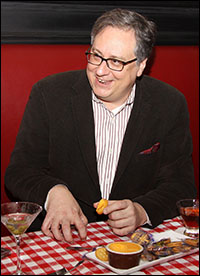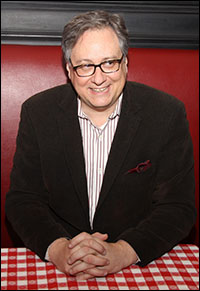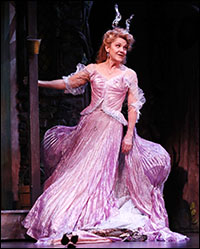| |
 |
|
| Douglas Carter Beane | ||
| photo by Joseph Marzullo/WENN |
What on Earth has become of Douglas Carter Beane?
It seems only yesterday he was the wisecracking author of satiric comedies, and the artistic director of a scrappy, upstart Off-Broadway theatre troupe.
These days, it seems he has a production on Broadway every year. This spring alone, he has a new play, The Nance, opening at the Lyceum Theatre — his first play for the tony Lincoln Center Theater. And the Rodgers & Hammerstein Organization has entrusted him with the Broadway debut of the songwriters' Cinderella. Douglas Carter Beane has become a distinguished theatre personage. "My younger self would come back and slap me," laughed Beane, who, too, saw the humor in his professional transformation. "I'm sure I'll ruin it all next season. I've got next season to bring myself back to normal. I mean, you just have to look at the chat rooms and it brings you right back down to Earth. As Tina Fey said, 'If your head gets too big, there's this thing called the Internet.'"
Beane relaxed with a Maker's Mark old-fashioned and feasted on Ritz crackers and a pot of Sardi's classically unfunny spread cheese in our booth on the second floor of Sardi's. It had been a long day. First, he went to Cinderella — which is now in previews at the Broadway Theatre — to put in a new scene. After that, he took a cab to Lincoln Center to attend a rehearsal of The Nance, which stars Nathan Lane and begins previews March 21.
Of the two projects, the play has been gestating longer. "Long-aborning!" said Beane, relishing the term so often deployed in theatre journalism. The play takes place in New York City from January to May of 1937, when Mayor LaGuardia was attempted to stamp out the city's still-thriving burlesque business.
"Burlesque was a huge industry," explained Beane, "but LaGuardia — it comes off that I hate him in this play. He was kind of an OK guy. But he did have this prudishness to him. He was a little messed up, as many Catholics are. He was very messed up about sex. So burlesque freaked him out and he wanted to get rid of it because the World's Fair was coming to town."
Lane plays Chauncey Miles, the "nance" of the title — a stock player common at the time who made a specialty of playing campy homosexual characters.
Beane wrote the role with Lane in mind. "Why lie?" said Beane. "I often write with specific actors in mind." He sent it to Lane, who read it in one night and immediately expressed interest in doing it. "He said, 'I don't want to do this commercially in New York,'" told Beane. "I said, 'Do you want to do it in London?' He said, 'Let me think about that.'" They did a reading, after which Lane resolved to do it in New York because the play is a New York story. Lane showed the play to LCT's artistic director Andre Bishop, who agreed to produce.
| |
 |
|
| Douglas Carter Beane | ||
| Photo by Joseph Marzullo/WENN |
"I had to come up with a style of speaking that sounded like 1937," he said. "So I spent a lot of time in the Wilkes-Barre area of Pennsylvania, where people still think it's the 1930s. And I watched a lot a Turner Classic moves. 'Say, you!' 'Not so fast!' 'What are ya, nuts?!' 'Whattaya, got a hole in your head?'"
Beane considers the play a bit of a departure for him. "I'm interested in period plays now. People expect the contemporary play from me and the sassy line. But I am interested in going into different periods. I love doing research. I love it."
For Cinderella, the research stretched back to the 17th century, to the original 1697 story by Frenchman Charles Perrault. "As I read it, I thought, that's really good," recalled Beane. "It was a really smart story. It wasn't a story where Cinderella was this psychotic waif who was prince-stalking and had foot fetishes. It was social satire. I thought, that's my way in."
With that, he said yes to the offer to rewrite the book, proffered by producer Robyn Goodman, who had been approached by the Rodgers & Hammerstein Organization to bring the 1957 television musical to the stage. He had initially turned the project down. "I said no because I didn't want to work with dead people," he said. "And then I didn't want to, because I knew Cinderella was just a minefield for everyone in terms of women's issues."
| |
 |
|
| Victoria Clark in Cinderella | ||
| photo by Carol Rosegg |
"I think both shows [The Nance and Cinderella] are the first time I don't feel any pressure to be funny," said Beane. "I'm funny — touch wood — but I don't feel I have to come up with a funny line. If a line doesn't get a laugh, we just cut it and put nothing there. There doesn't have to be a laugh. Cinderella is, first and foremost, a romance." He won't even call The Nance a comedy, but refers to it, hedgingly, as "a tragic comedy. It's a bittersweet, sad, love story. But it's comic. Just call it a play. It's a play."
He added, with a laugh: "I'm just getting old. I'm running out of glib. I just can't be glib anymore."
Beane — like the early 20th-century theatre pros he frequently cites and seems to emulate — spends the theatre season, September to June, in the city. But when summer arrives, he decamps with his family to a lakehouse in central Pennsylvania, a politically conservative area he calls "Pennsyltucky." ("Been voting against their best interests for a century.")
"It sounds more glamorous than it is," he said. "But really, when summer comes, it's 'Everybody get in the car. We're going to Pennsylvania!'" Once there, he often writes on his front porch, staring out at the lake. A couple times in the past year, that bucolic idyll was almost interrupted to tempting work opportunities. "They were both artistic directorships." In both cases, he didn't get the job, and he doesn't sound sorry about that. "I kinda can't do it. I've done it before." Does he ever miss his days as an artistic director of Off-Broadway's The Drama Dept.? "I do. But three people — two who have done it in the past, one who is doing it in the present — have said to me, 'You did it. You don't have to do it again. You're hitting your stride as a writer. You have to concentrate.'"
And so it's Broadway, which has its own benefits, including a Valentine's Day card Beane received from his daughter, after she had seen Cinderella: "To my poppy, who wrote the play with the really beautiful costumes."











